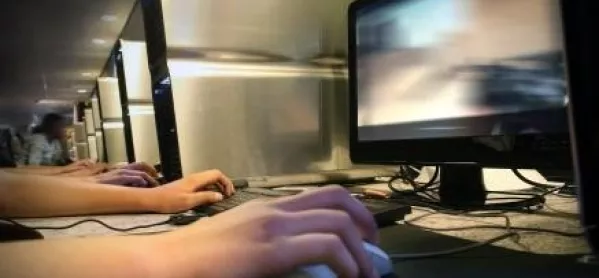‘Experiment phobia’ cured by internet

A-level chemistry students need not be afraid: 40,000 of them can now carry out practicals on-screen in a bid to overcome what is becoming known as “experiment phobia”.
Burns, spillages and volatile reactions are putting pupils off handling potentially dangerous chemicals, according to the Royal Society of Chemistry (RSC).
The time pressure of the curriculum is stopping pupils from developing their practical skills, meaning they lack confidence in the lab.
In response, the RSC is promoting the use of LabSkills, a ground-breaking computer program allowing pupils to overcome their fears by experimenting online.
It is being distributed to all 8,000 secondary school chemistry teachers next week and can be used free for three months.
“In chemistry you are working with things that can be quite dangerous if handled wrongly,” said Lorna Thomson, project officer at the RSC. “To be nervous about that is understandable.
“But the deadlines that students are under mean they are not getting the chance to become familiar with practical chemistry. It is creating a phobia. The idea of this is that they can make their mistakes before they go in the lab. They can gain and hone their skills first.”
As well as banishing pupils’ fears, the aim of the project, which has been developed by Bristol University, is to increase teachers’ confidence in carrying out practical demonstrations in class. Teacher-training courses devote relatively little time to practical chemistry, according to Dr Thomson.
“It can be daunting for a teacher to do chemistry demonstrations in front of a class,” she said. “If we can boost their confidence in doing practicals, it will transfer to pupils.”
Dr Thomson said that virtual experiments were designed only to promote practical work, not replace it. They will also allow students to experience higher-level techniques that are not normally encountered until university, she said.
In a report last year, Ofsted said that the national curriculum and testing regime led to boring and repetitive science lessons. Too much time was spent preparing pupils for exams instead of letting them do practical experiments, inspectors said.
This week, Policy Exchange, a right-wing think-tank, criticised the Government for misleading the public over the number of pupils studying science, technology, engineering and maths.
The school population has “increased considerably since 1997, meaning we cannot derive any accurate measure of how popular STEM subjects are from raw numbers,” the report said. Since 1997, the percentage of pupils studying A-levels in biology, chemistry and physics has fallen, it added.
Annette Smith, chief executive of the Association for Science Education, said she had not seen any evidence that pupils had a “phobia” of doing experiments, but welcomed the promotion of practical science.
“Simulations cannot develop the handling skills that are an important part of practical work, but they can develop the ideas and concepts,” she said. “This is not a nail in the coffin of practical work. I can’t imagine that teachers will use this as an excuse not to do practical work.”
Pharmaceutical company Pfizer is providing up to pound;1 million to the RSC over the next five years to support initiatives such as virtual labs.
Dr Tony Wood, worldwide head of medicinal chemistry at Pfizer, said it could “revolutionise” the way science is taught in schools and make pupils more independent.
E-DAY LANDING
An energy-saving event on the Isles of Scilly will see the island’s school federation become the first to measure the electricity it uses in 24 hours.
E-Day, which takes place next Tuesday, will be based on the community’s collective effort to cut usage. Schools will be plugged into the National Grid where they can read their progress and watch the experiment on live electricity meters created specifically for the site.
The Five Islands School has become heavily involved in preparing for the initiative, launching videos on YouTube, radio casts, and Twitter updates.
If successful, the experiment could be rolled out to schools across the country to help engage children with the effect energy consumption has on the environment.
Dr Matt Prestcott, the brains behind the Ban the Bulb campaign now used in 30 countries, has been driving the project. He has designed lessons for schools to use throughout the day.
“The E-Day experiment will hopefully prove that we can make a big difference when we work together to try to save energy, and that we can cut our energy bills and reduce carbon emissions through a range of quick and simple actions,” he said.
E-day will be sponsored by the Department of Energy and Climate Change. GL.
Keep reading for just £1 per month
You've reached your limit of free articles this month. Subscribe for £1 per month for three months and get:
- Unlimited access to all Tes magazine content
- Exclusive subscriber-only stories
- Award-winning email newsletters



